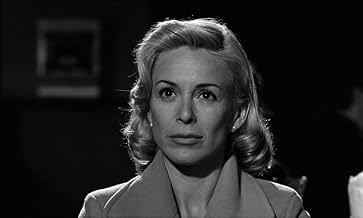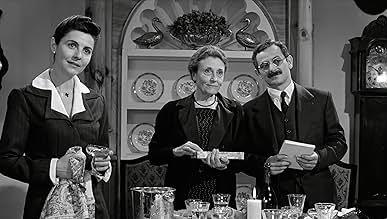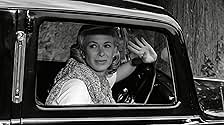Aggiungi una trama nella tua linguaSpain, late 1940s. Julia leaves Madrid after falling into a deep depression when his lover, José Miguel, a prominent painter and opponent of the Fascist regime, is incarcerated.Spain, late 1940s. Julia leaves Madrid after falling into a deep depression when his lover, José Miguel, a prominent painter and opponent of the Fascist regime, is incarcerated.Spain, late 1940s. Julia leaves Madrid after falling into a deep depression when his lover, José Miguel, a prominent painter and opponent of the Fascist regime, is incarcerated.
- Regia
- Sceneggiatura
- Star
- Premi
- 15 vittorie e 22 candidature totali
Recensioni in evidenza
This movie has been elected by the Spanish Academy of Cinematography to represent Spain at the Oscar's. In fact, I think it has a lot of possibilities to win. It's one of the best pictures I've seen lately. An elegant and delicate direction, warm and sentimental dialogues, superb performances by all the entire cast... make this film remain in your memory (and in a special place of the heart) once you've seen it. The way it touched me is simply magic.
With 'You're the One' José Luis Garcionce attempts again to create a reminiscent mood piece. However, I felt that the film was lacking. The use of black and white does give it a very classic feel of a movie from the 1950s (which is clearly what the director intended if that wasn't so obvious from the numerous references) but I felt that it would have been much more effective in colour because of the landscape and surroundings that are so stunningly captured by Raúl Pérez Cubero's cinematography. The colour could have been used to add to the atmosphere. The characters are interesting but the spoken lines are clichés. The soundtrack is adequate and the performances are competent. Julia Gutiérrez Caba and Ana Fernández standout. I appreciate the subtlety and the fact that director Garcionce has steered clear of melodrama. The film itself failed to engage me as a whole. I wouldn't say that watching ''You're the One' but in the end there wasn't much that resonated.
Whereas the use of black and white in modern films may well be considered appropriate perhaps nowhere better explored to great effect in Spielberg's `Schindler's List' one cannot help thinking that resorting to this vehicle of expression should be for photographic reasons, not in an attempt to kindle preterite ambientation. Therefore the filmed interiors in `You're the One' are reasonably acceptable, but the exteriors should have been in colour. If only for the reason that the Principality of Asturias, on the Cantabrian coastline in the north of Spain, has some of the most beautiful scenery you are ever likely to see. Asturias majestically sweeps from peaks of over 2,000 metres down to the sea, fragmented by the most beautiful river valleys in deep gorges.
Apart from that little quibble, suffice to say that with `You're the One' Garci is bent on continuing his overly sensibilised incursions into yesteryear, taking great pains over the details of each scene, in order to produce a story which is supposed to awaken a rather varied range of feelings in the viewer. It depends on how old the viewer is and where the viewer lives .. If the viewer is too young or not Spanish, he may well rush out and get a DVD of `The Lord of The Rings' or the latest blockbuster from Seagal, Willis, van Damme and the like. However, a viewer of my age the same as Garci who has any recollections whether favourable or not of the social conditions reigning in Spain in those bygone decades, the reaction is likely to be something like: yes, very nice, but
It is this `but' which worries me. Ever since `Volver a Empezar' through `La Herida Luminosa' (qv) up to that little masterpiece `El Abuelo' (qv), Garci has used his commendable skill to great effect, evoking real human stories to wonderful effect. This is plainly manifested also in `You're the One', with some really magnificent interpretations, especially by Lydia Bosch and Iñaki Miramón (tut, tut, smoking in a classroom of children .); of course both Julia Gutiérrez Caba and Fernando Guillén are excellent lending `nobility' to the proceedings; we must not overlook the always natural appearance of Manuel Lozano, here as elsewhere in his filmography most notably in his first film `La Lengua de las Mariposas' (qv). Juan Diego plays an excellent part, later overshadowed by his part in the heroic TV mini `Padre Coraje' (qv).
But .. Could not Garci in his reminiscences come a little closer to the modern day? Could he not put on the screen stories of more recent times, instead of delving back into the murky mists of the past? Possibly not: Garci himself is so deeply immersed in the Hollywood of the 1940s and 1950s which he admires so greatly, seemingly he is not disposed to coming out but very much intent on keeping alive that time-worn spirit of `Casablanca' and `Gone With the Wind' et. al. Cinema which, for me, is so outdated and so awkwardly plastic, that I cannot sympathise with Garci's predeliction: it all seems so much from another planet.
The photography is very good. The music has good moments, but frequently wanders off into almost plagiaristic fragments so mindfully aware of Antón García Abril.
Apart from that little quibble, suffice to say that with `You're the One' Garci is bent on continuing his overly sensibilised incursions into yesteryear, taking great pains over the details of each scene, in order to produce a story which is supposed to awaken a rather varied range of feelings in the viewer. It depends on how old the viewer is and where the viewer lives .. If the viewer is too young or not Spanish, he may well rush out and get a DVD of `The Lord of The Rings' or the latest blockbuster from Seagal, Willis, van Damme and the like. However, a viewer of my age the same as Garci who has any recollections whether favourable or not of the social conditions reigning in Spain in those bygone decades, the reaction is likely to be something like: yes, very nice, but
It is this `but' which worries me. Ever since `Volver a Empezar' through `La Herida Luminosa' (qv) up to that little masterpiece `El Abuelo' (qv), Garci has used his commendable skill to great effect, evoking real human stories to wonderful effect. This is plainly manifested also in `You're the One', with some really magnificent interpretations, especially by Lydia Bosch and Iñaki Miramón (tut, tut, smoking in a classroom of children .); of course both Julia Gutiérrez Caba and Fernando Guillén are excellent lending `nobility' to the proceedings; we must not overlook the always natural appearance of Manuel Lozano, here as elsewhere in his filmography most notably in his first film `La Lengua de las Mariposas' (qv). Juan Diego plays an excellent part, later overshadowed by his part in the heroic TV mini `Padre Coraje' (qv).
But .. Could not Garci in his reminiscences come a little closer to the modern day? Could he not put on the screen stories of more recent times, instead of delving back into the murky mists of the past? Possibly not: Garci himself is so deeply immersed in the Hollywood of the 1940s and 1950s which he admires so greatly, seemingly he is not disposed to coming out but very much intent on keeping alive that time-worn spirit of `Casablanca' and `Gone With the Wind' et. al. Cinema which, for me, is so outdated and so awkwardly plastic, that I cannot sympathise with Garci's predeliction: it all seems so much from another planet.
The photography is very good. The music has good moments, but frequently wanders off into almost plagiaristic fragments so mindfully aware of Antón García Abril.
Splendid and gorgeous film from the Academy Award winning director of ¨Volver a Empezar¨ . Enjoyable drama with mood pieces about Spain of the 40s ; including enjoyable performances , adequate set design and delightfully shot . Deeply depressed Julia (Lydia Bosch) leaves Madrid to return to the village of her youth , there she meets old friends (Ana Fernandez , Julia Gutierrez Caba) , friendship (to a boy , Manuel Lozano) and love (to a Elementary teacher , Iñaqui Miramon). She seems to have reached the end of his life and of his art in writing , but then Julia leaves an indelible mark on all , while she changes for the better. In village her life is simplistic and gentle , experiencing great impact all around . The villagers inspire her and give life .
This is a thought-provoking drama filmed with great sensitivity and feeling. It's an intelligent and touching story although sometimes is slow moving and tiring but is finely developed with sense of style and sensibility . Very pleasant drama , plenty of sensitivity , emotion , artistic scenes and abundant outdoors filmed on glamorous exteriors perfectly photographed . In the picture are treated ethics and morals themes developed with great sense of fairness and ductility . Interesting screenplay by Jose Luis Garci and Horacio Valcarcel ; Garci often co-writes his scripts with his friend Horacio Valcarcel . This is Garci's return to top form, with a brooding and engaging script which uses entertaining situations to give us a good movie in a high sense and intimate sensitivity and that kept me entertained for the almost two hours of duration . Filmed in his usual formal and luxurious style , without leaving a trace the joyful themes , in terms of dramatic and narrative excitement . It is well set and is as marvelously filmed as it is written and acted . This is one of those rare gems that does not stray from its purpose - to be a celebration of love , nature , and romance and a sensitive tale . Excellent acting by Lydia Bosch as a deranged woman who will have to face the traumatic past and choose between her upsettings old experiences and love . Support cast gives nice interpretations such as Ana Fernandez , Julia Gutierrez Caba , Fernando Guillén , Carlos Hipólito , Marisa de Leza , Jesús Puente , Francisco Algora and Juan Diego as a stiff priest . Awesome cinematography in black and white by Raul Perez Cubero as is reflected on the marvelous outdoors of the countryside and brilliant interiors . Well filmed on marvelous locations as Natutal Park of Muniellos , Llanes, , Church of Valdedios and Santa Cristina Lena (Asturias) . Emotive and sensitive musical score by Pablo Cervantes . Spectacular as well as evocative production design by Julian Mateos ( Tiovivo c. 1950 , You're the one , El Abuelo) , Garci's usual .
The motion picture was compellingly directed by Jose Luis Garci (El Crack I, II, Luz Domingo) who won one Academy Award for ¨Volver a Empezar¨. José Luis Garci is without a doubt one of the most influential film personalities in the history of film in Spain and perhaps the best known writer in the country. He has left a distinguished talent in his successful movies throughout the years: La Cabina (1972), Las Verdes Praderas (1979), El Crack (1981), Volver a Empezar (1982), Canción De Cuna (1994), La Herida Luminosa (1997), El Abuelo (1998), Tiovivo c. 1950 (2004) and Ninette (2005) , among others. Rating : Better than average and well worth seeing . For these reasons is essential and indispensable watching .
This is a thought-provoking drama filmed with great sensitivity and feeling. It's an intelligent and touching story although sometimes is slow moving and tiring but is finely developed with sense of style and sensibility . Very pleasant drama , plenty of sensitivity , emotion , artistic scenes and abundant outdoors filmed on glamorous exteriors perfectly photographed . In the picture are treated ethics and morals themes developed with great sense of fairness and ductility . Interesting screenplay by Jose Luis Garci and Horacio Valcarcel ; Garci often co-writes his scripts with his friend Horacio Valcarcel . This is Garci's return to top form, with a brooding and engaging script which uses entertaining situations to give us a good movie in a high sense and intimate sensitivity and that kept me entertained for the almost two hours of duration . Filmed in his usual formal and luxurious style , without leaving a trace the joyful themes , in terms of dramatic and narrative excitement . It is well set and is as marvelously filmed as it is written and acted . This is one of those rare gems that does not stray from its purpose - to be a celebration of love , nature , and romance and a sensitive tale . Excellent acting by Lydia Bosch as a deranged woman who will have to face the traumatic past and choose between her upsettings old experiences and love . Support cast gives nice interpretations such as Ana Fernandez , Julia Gutierrez Caba , Fernando Guillén , Carlos Hipólito , Marisa de Leza , Jesús Puente , Francisco Algora and Juan Diego as a stiff priest . Awesome cinematography in black and white by Raul Perez Cubero as is reflected on the marvelous outdoors of the countryside and brilliant interiors . Well filmed on marvelous locations as Natutal Park of Muniellos , Llanes, , Church of Valdedios and Santa Cristina Lena (Asturias) . Emotive and sensitive musical score by Pablo Cervantes . Spectacular as well as evocative production design by Julian Mateos ( Tiovivo c. 1950 , You're the one , El Abuelo) , Garci's usual .
The motion picture was compellingly directed by Jose Luis Garci (El Crack I, II, Luz Domingo) who won one Academy Award for ¨Volver a Empezar¨. José Luis Garci is without a doubt one of the most influential film personalities in the history of film in Spain and perhaps the best known writer in the country. He has left a distinguished talent in his successful movies throughout the years: La Cabina (1972), Las Verdes Praderas (1979), El Crack (1981), Volver a Empezar (1982), Canción De Cuna (1994), La Herida Luminosa (1997), El Abuelo (1998), Tiovivo c. 1950 (2004) and Ninette (2005) , among others. Rating : Better than average and well worth seeing . For these reasons is essential and indispensable watching .
A movie in black and white about a very simple story, about the sadness of losing a person you love with that kind of love that should be forbidden. A movie about movies, about impossible love, about fanatism, about life. A story from those times, "una historia de entonces", with a talented director at his best. Another kind of cinema, the kind of cinema only a few chosen people can do.
Lo sapevi?
- Citazioni
Don Matias: My God, why haven't you forsaken me?
- ConnessioniFeatures Gunga Din (1939)
I più visti
Accedi per valutare e creare un elenco di titoli salvati per ottenere consigli personalizzati
Dettagli
- Data di uscita
- Paese di origine
- Sito ufficiale
- Lingua
- Celebre anche come
- You're the One
- Luoghi delle riprese
- Aziende produttrici
- Vedi altri crediti dell’azienda su IMDbPro
- Tempo di esecuzione1 ora 51 minuti
- Colore
- Mix di suoni
- Proporzioni
- 2.35 : 1
Contribuisci a questa pagina
Suggerisci una modifica o aggiungi i contenuti mancanti

Divario superiore
By what name was You're the one (una historia de entonces) (2000) officially released in Canada in English?
Rispondi



























